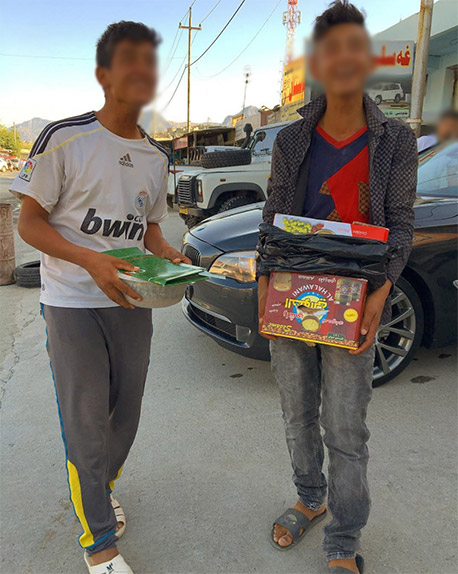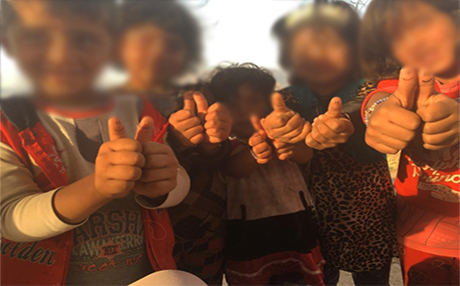Since its liberation from ISIS control in November 2015, much of this city is uninhabitable. Even though Shingal is no longer under ISIS control, many Yezidi families are still residing in camps within the borders of the Kurdish Region of Iraq. One of these places, Camp Rawanduz, is home to small group of families who fled Shingal in August 2014. They are hoping to return home.
It was here, on the outskirts of the small town of Rawanduz, that I encountered a young displaced Yezidi boy named Emad. His unique love for birds inspired me to write this article, detailing his story and the struggle of his people. My time spent with Emad and his friends in the hot summer months of 2016 opened my eyes to a whole new way of life, showing me the horrors that many only see through a television screen. It is through Emad that I am able to briefly tell the story of the Yezidis and the hope for their future.
This is his story.

Emad, a 16-year-old boy from Shingal.
Emad squats on a dusty cinderblock, hiding in the shade from the burning mid-afternoon sun. He sits and chews sunflower seeds, spitting the salty shells on the dusty ground by his feet. Several of his pigeons wander back and forth in the shade near him, picking at small bits of seed and bread. Perched on his cinderblock in front of me, Emad and his birds are taking refuge not only from the sun, but also from the Islamic State.
Emad is 16 years old, and his high-pitched voice carries with it a bit of sarcasm, even when I can’t understand his words. Along with 200 other Arabs and Yezidis, he lives in a small camp for internally displaced persons (IDPs) in a quiet town called Rawanduz, two hours north of Erbil, the capital city of the Kurdish Region. His beloved birds softly coo and wander around us.
Emad’s cinderblock seat is next to a makeshift bird coop, which is shaded by a worn out blue United Nations tarp that protects the birds from the scorching sun. Emad enjoys sitting with his birds, watching all eight of them eat and drink before letting them stretch their wings and fly over the camp. The love Emad has for his birds is unique, setting him apart from everyone else in the camp.
The camp is conveniently located next to an abandoned stadium. Like the rest of the Yezidis, Emad enjoys playing football. Once the sun falls low to the horizon, cooling the dusty summer air, you can find him running in the overgrown stadium with other Yezidis, all of them engaged in a competitive game of football. As the men run after each other and the young children play together on the sidelines, Emad’s birds soar through the evening air, flapping their wings high above the field below.

Shingal
Sadly, these are not the same birds he had back in Shingal. Those are gone, along with his childhood home. The sectarian violence that has engulfed Iraq since the rise of ISIS forced him to give up his birds, pushing his family out of its ancestral home in the Nineveh Plains and into the mountains of Kurdistan. Based on a radical interpretation of Sunni Islam, ISIS established a caliphate in Iraq and Syria and with its rapid and brutal rise it carried out a systematic and genocidal campaign of death and destruction.
The ISIS offensive forced Emad and thousands of others into the mountains just north of Shingal. Emad and 200,000 Yezidis were able to escape death, violence, and sexual repression through a humanitarian corridor opened by Kurdish Peshmerga forces. Many were not so lucky, as between 2,000 and 5,000 Yezidi men, women, and children were murdered or enslaved by ISIS in what is known as the Shingal Massacre. Suffering from what has now been recognized as genocide by the United Nations, the Yezidi people were thrust into the spotlight of the international community. Their persecution and suffering became a rallying cry in the global fight against ISIS.
The Peacock Angel
The Yezidi faith is an ancient religion that predates Islam. They believe in one God who is represented by seven angels. The most important angel to Yezidis, Melek Tawous, or the Peacock Angel fell from heaven after refusing to bow to Adam. This defiance in the face of God caused Melek Tawous to be cast from Heaven and sent to Earth. After falling from God’s grace, Melek Tawous was later forgiven, returning to Heaven. Some extremists still unjustly relate the Yezidi veneration and worship of Melek Tawous to devil worshiping as in Islam it was the devil that was expelled from heaven.
Enslavement
Further, the Yezidis do not have a written or sacred text such as the Bible, Koran, or Torah. This allows ISIS to kill them without remorse, as it is justified by their radical interpretation of the Koran. Unlike the Christians of northern Iraq, the Yezidis have faced the worst type of oppression as they are not, ‘People of the Book.’ Subsequently, with the unjust labels of devil worshippers the Yezidis were faced with two options when ISIS took over Shingal: conversion to Islam or beheading. Those who weren’t executed—many women and young girls—were given as prizes and brides to fighters. Girls as young as 11 were raped repeatedly, given a monetary value and sold off, and forced into a life of sexual slavery and servitude. Boys of fighting age like Emad were beheaded or lined up and shot in the head.
More than thirty mass graves and killing fields, filled with the remains of innocent victims, have been discovered in and around Shingal since its liberation from ISIS rule in November 2015. Containing the bones of murdered Yezidis, these mass graves, in combination with forced slavery and sexual servitude, amount to the world’s first case of recognized genocide since Darfur in 2003. Thousands of Yezidi men, women, and children are still missing.
Hope
In Soran, a small city just north of Rawanduz, Emad and I wander a busy street in the bazaar. It is evening time during the holy month of Ramadan and the sun is setting, its rays dulled as it falls to the horizon. Men and women hurriedly shop for last minute fruits and vegetables before breaking their fast. We walk together into a small bird shop to buy two new pigeons for his collection back in the camp. After about twenty minutes of excited browsing, Emad decides on a pair of brown and white pigeons, a strong male and a female, complete with a fertilized egg. I’m happy to give Emad this present of two new pigeons and a soon-to-be chick. As we travel back to Rawanduz in a taxi, Emad’s birds are headed for a new home and a new life.
Much of Shingal still lies in ruin. If the city is rebuilt, Emad will return home with his new birds. Until then, he will patiently care for his birds in the camp and remember better days before the war.





Comments
Rudaw moderates all comments submitted on our website. We welcome comments which are relevant to the article and encourage further discussion about the issues that matter to you. We also welcome constructive criticism about Rudaw.
To be approved for publication, however, your comments must meet our community guidelines.
We will not tolerate the following: profanity, threats, personal attacks, vulgarity, abuse (such as sexism, racism, homophobia or xenophobia), or commercial or personal promotion.
Comments that do not meet our guidelines will be rejected. Comments are not edited – they are either approved or rejected.
Post a comment